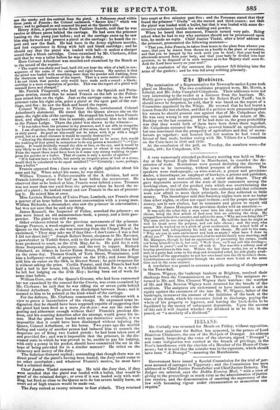Ebt Vrobincts.
The nomination of a Representative for Newcastle-under-Lyme took place; on Monday. The two candidates proposed were, Mr. Harris, a Liberal, and Mr. John Campbell Colquhoun. Their addresses were not very interesting to the reader at a distance from the hustings. Hr. Harris gave a qualified approbation to Sir Robert Peel's Tariff; but it should never be forgotten, he said, that it was based on the report of a Committee appointed by the Whigs. He avowed that he had learnt a lesson from the last election, and that if a petition were presented against his return be should present one against that of Mr. Colquhoun also. He was very wrong in not presenting one against the return of Mr. Buckley on the last occasion. If he had done so, the great probability was that they would both of them have been down there together. Mr. Colquhoun censured the Whigs ; avowed himself an agriculturist, but one convinced that the prosperity of agriculture and that of manu- facture go together ; and boasted that last session be bad voted in favour of free trade, besides voting with Mr. Villiers for a Committee on the Corn-laws in 1838 and 1839.
At the conclusion of the poll, on Tuesday, the numbers were—for Harris, 499; for Colquhoun, 479.
A very numerously attended preliminary meeting was held on Mon- day at the Spread Eagle Hotel in Manchester, to consider the de- pression of trade. Resolutions were passed declaring the distress in
the town to be increasing, without prospect of alleviation. The speakers were tradespeople,--a wire-worker, a grocer and provision- dealer, a linendraper, an employer of hawkers, a printer and publisher, a house-agent and rent-collector, and a tailor and draper. They all gave deplorable accounts of the state of their customers among the working-class, and of the gradual ruin, which was overwhelming the shopkeepers of the middle-class. The rent-collector said that collectors were now afraid to meet their principals, for they collected so little money. The linendraper said that Saturday nights were now no better than other nights, or often not equal to them ; and the people spent their money, not in new clothes, but in remnants and pieces to repair old ones. Mr. James Hampson the provision-dealer told an anecdote— It was only the other day a man came into his shop and seized a piece of cheese, being the first article of food near him on entering the shop. He jumped from behind the counter, and said to the man, "Why are you doing this ?" The man said he was starving to death for food. Ile told the man he might as well let bread serve his purpose, and not take cheese ; and the man, who seemed to be worked up to a pitch of great excitement, then seized hold of a four-pound loaf, relinquishing his hold on the cheese. He said to the man, " Why are you in such excitement and look so angry ? what have I done to offend you ?" The man then repeated, that he and his family were starving; and Mr. Hampson, though he had an opportunity of preventing his escape, could not bring himself to do it, but said, " Well then, we'll not call this stealing— the bread is yours"; and he went off with it. Nor was this a solitary case of levying provisions in this way. Within the last three weeks, ten or a dozen men in a party had come to his shop and demanded relief, his wife gladly avail- ing herself of the opportunity to put her own hand into the till to relieve them. Contributions on his neighbours through the street were levied at the same time and in the same manner.
A resolution was passed to convene a public meeting of shopkeepers in the Town-hall.
Messrs. Wigney, the bankrupt bankers at Brighton, received their discharge from the Commissioners on Thursday. The assignees re- turned to Mr. and Mrs. Clement Wigney their watches : the watches of Mr. and Mrs. Newton Wigney were detained for the benefit of the creditors. The assignees are understood to have instituted a suit in equity against the executors of the late Mr. W. Wigney, father of the bankrupts, to recover the amount of the liabilities of the bank at the time of his death, which his executors failed to discharge, paying the whole of his property to legatees, and leaving the bank-debts to be liquidated by the money of subsequent depositors. Upon the success of this suit it will depend whether the dividend is to be 10s. in the pound, or " a mockery of a dividend."


























 Previous page
Previous page